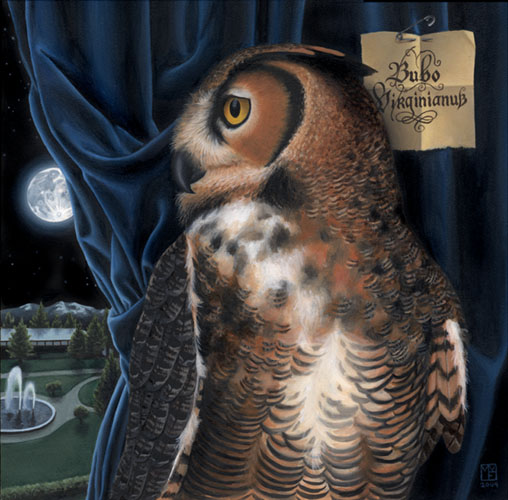Associated Words:
Adjectives: Something that is like an Owl is said to be "Owlish" or "Strigine"
Adverb: "Owlishly"
Collective noun: A group of Owls is called a Parliament, but also see below.
Offspring: A baby owl is called an Owlet.
Origins of the Word "Owl"
The word owl originated in early European languages. In old Norse, an Owl was known as "ugla", and in old German, it was "uwila". Both of these words may have been created as sounds that described the unique call of an Owl.
In Old English (about 600 A.D. to about 1000 A.D.), owl was "ule", a word similar to the original Dutch word.
In Middle English (about 1000 A.D. to the 1400s), the word became "owle", later shortened to the form we use today.
Throught this time, various early written records have variations on this spelling, including "uwile", "oule", "owell", "hoole", and "howyell".
Other ancient cultures also had words for "owl" that described the Owl's hooting call - In India, Owls were once known as "oo-loo" and in Hebrew, "o-ah".
Origins of the Scientific Names
Strigiformes: All Owls are classified as members of this order. The name is formed from "Strig", the plural form of the Latin word "strix", meaning "owl" and "formes", meaning "forms".
Strigidae: The family for all Owls except Barn Owls, derived from "Strix", a Latin word for owl (also the same in Greek)
Tytonidae: All barn owls are members of this family. The name is derived from the Greek word "tuto", which means "owl".
Aegolius: A Latin word for bird of prey. It is also similar to the Greek word "aigolios" meaning a bird that is an evil omen.
Asio: Attributed to Pliny the Elder in his "Naturalis Historia" around 77 AD. Latin for 'Horned Owl'.
Athene: One of the ancient Greek deities, originally known as the goddess of night. She was symbolized by the image of an Owl. Over time, her role evolved into the goddess of war, wisdom, and the liberal arts.
Glaucidium: The diminutive form of the Greek word "glaux", or "little owl".
Micrathene: Formed from the Greek word "mikros", meaning "small".
Nyctea: From the Greek word "nuktia", meaning "of the night" (This genus name is no longer used for owls).
Otus: A variation of the original Greek word "otos", meaning "owl".
Tyto: A variation of the Greek word "tuto", meaning "owl".
Collective Nouns
While "parliament" is the generally accepted word for a group of owls, here are alternatives and additions that I've seen:
A bazaar of Owls
A brood of Owls
An eyrie of Owls
A hooting of Owls
A looming of Owls
A nest of Owls
A stooping of Owls
A brood of Owlets
A diss of Owls
A pair of Owls
A parliament of Owls
A sagaciousness of Owls
A stare of Owls
A wisdom of Owls
A stable of Barn Owls
A jail of Barred Owls
A prohibition of Barred Owls
A schizpphrenia of Hawk Owls
A volery of Little Owls
A parliment of Long-eared Owls
A blizzard of Snowy Owls

